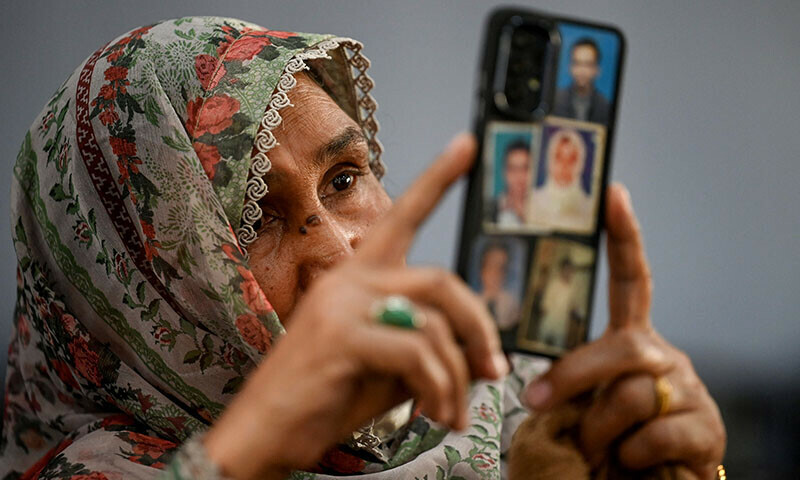Aroosa Khan’s child was talking on WhatsApp yet unexpectedly got himself the objective of “vigilante” examiners who blamed him for having committed obscenity on the web.
The 27-year-old is one of hundreds of young men facing charges of making blasphemous statements online or in WhatsApp groups, a crime for which arrests have increased dramatically in recent years.
Rights groups and the police claim that private “vigilante groups,” led by lawyers and supported by volunteers who search the internet for criminals, are bringing many of the cases to trial.
Doctors, engineers, lawyers, and accountants’ families in Pakistan claim that their loved ones were tricked into sharing blasphemous material online before being arrested.
Khan told AFP that her son, who has not been named for security reasons, had been tricked into sharing blasphemous content on the messaging app. “Our lives have been turned upside down,” she said.
One neighborhood police report proposes that the vigilantes might be roused by monetary profits.
Over the past three years, 27 people have been found guilty and given the death penalty or life in prison by one of these groups.
AFP has gone to various trials in the capital Islamabad, where young fellows are being arraigned by confidential vigilante gatherings and the Government Examination Organization (FIA) for profane web-based content.
Among them is Aroosa’s child — who had joined a WhatsApp bunch for work searchers and was reached by a lady.
According to his mother, she sent him images that were offensive, and the contact then “denied having sent it and asked Ahmed to send it back to her to understand what he was talking about,” she said.
The FIA brought charges against him after his arrest.
‘Respectable objective’
The most dynamic confidential examination bunch is the Lawful Commission on Lewdness Pakistan (LCBP), which told AFP they are arraigning in excess of 300 cases.
Sheraz Ahmad Farooqi, one of the confidential examination gathering’s chiefs, let AFP know that in excess of twelve workers track online sacrilege, trusting that “God has picked them for this honorable objective”.
We are not executioners; We are taking the right path,” Farooqi told AFP outside of a courtroom that heard 15 cases of blasphemy brought by his group.
He stated that the majority of the accused were addicted to pornography and disrespected revered religious figures by using their names and dubbing voices over pornographic content.
Although they were not members of his group, he acknowledged that women were involved in the pursuit and arrest of the men.
Even though the death penalty is frequently commuted to life in prison upon appeal to the Supreme Court, cases can drag out for years, and Pakistan has never executed anyone for blasphemy.
In September, a special court was set up to speed up the dozens of pending cases, with AFP present.
In this photograph taken on October 2, relatives of youngsters prosecuted for supposed web-based irreverence go to a question and answer session in Islamabad. — The Human Rights Commission of Pakistan (HRCP) reported that numerous vigilante groups were working with “vested agendas” to “witch-hunt” individuals for online expression or to fabricate evidence of blasphemy using social media.
According to a media-leaked Punjabi police report from 2024, “a suspicious gang was trapping youth in blasphemy cases,”
The report “The Blasphemy Business” was sent to the FIA with suggestions for starting an in-depth investigation to find out where the vigilante groups get their funding.
On condition of anonymity, two FIA officials informed AFP that they had received the report but denied that their office was acting on vigilante group tips.
The FIA didn’t answer demands for true remark.
Outside the court, an official involved in the cases’ prosecution told AFP: None of the arrested people were held in any way. The crime was committed by them.
“We have to enforce it as long as the law is there,” according to the law.
According to Arafat Mazhar, director of Alliance Against Blasphemy Politics, a group that opposes the misuse of blasphemy laws, the alarming rise in cases was not caused by individuals “being suddenly more blasphemous,” he told AFP.
He said that a significant factor was the rise in the use of messaging apps and social media, as well as the ease with which content can be shared and sent.
Shunned The accused have a difficult time finding defense attorneys who are willing to represent them, and even the smallest accusation can turn a family into a pariah.
Nafeesa Ahmed said that her family was shunned by close relatives. Her brother, whose names have been changed, is accused of sharing blasphemous images on WhatsApp.
“There is a gigantic expense that groups of blamed are bearing. First and foremost, our safety and lives are in danger,” she told AFP.
She said that some of the families have been fighting the cases by selling houses and gold that were given to brides on their wedding day for thousands of dollars.
In the capital, dozens of families who have joined together to form a support group called for an independent commission to look into the vigilante groups and the role they play in prosecuting Pakistanis for blasphemy.
According to Nafeesa, “in this society, if someone commits a murder, he can survive because there are thousands of ways to come out of that,” whereas “if someone is accused of blasphemy, he cannot.”
“With regards to irreverence, general society has its own court and even relatives will leave you. ”
Image for header: In this photograph taken on October 2, a relative of an individual prosecuted for supposed web-based sacrilege, goes to a question and answer session in Islamabad. — AFP



